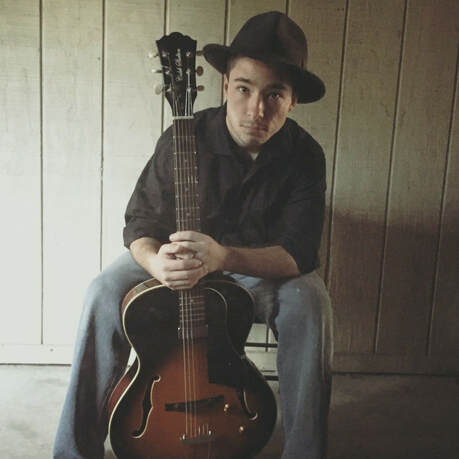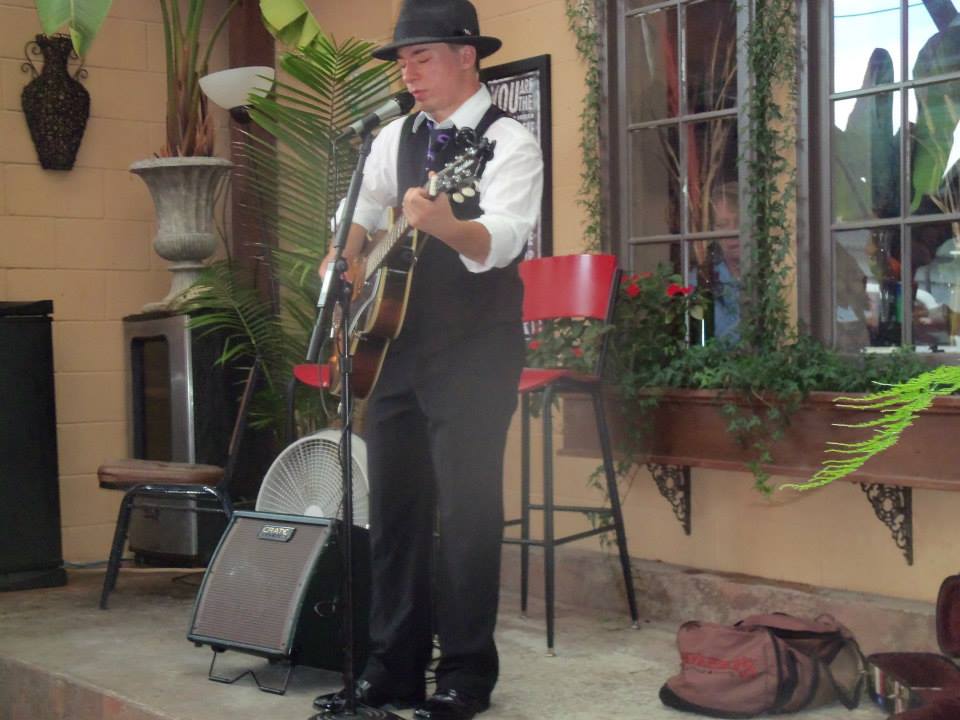
Caleb Shelton Interview
Q: Can you talk about your history as an artist?
A: I started out playing Johnny Cash cover songs at a bluegrass & BBQ fundraiser that our local fire department put on. It was my first real chance to get out in front of an audience and learn how to perform like that. That was around 2006. Over the next few years I spread out and started playing other venues and covering mostly ’6's artists like Bob Dylan, Neil Young and the Beatles. I probably started writing songs about 2009 and incorporating them into my sets. I knew they would never be my best work, but I felt it vital to the process.
After doing that off and on for a few years, I recorded and released my first album in 2017 entitled Walk With Me. Once again, it wasn't incredible but it was a starting point, and my writing had come a long way from 2009-2017. Since then I try to release two albums a year and so far I've been successful in that goal.
Q: What is your recording process like? You explain it’s completely DIY.
A: Usually I'll start with guitar and vocals and build a track one instrument at a time from there. I typically only do four or five takes of each part and go with the best one. Once everything is recorded I mix it down and save it.. Everything's done from home on my desktop. I've learned a lot doing it that way.
Q: What is your creative process like?
A: Every day I try to come up with a little riff or a line. It may or may not ever become a song, but I try to write a little something every day and record it on my phone. From there, I'll go back and listen to it a few times and try to build on it in my head while I'm in the office or wherever. Then when I get home I start annotating the rough draft that I've built in my head and begin finalizing it.
There are times when I'm at Walmart or wherever and I get a rhyme or two stuck in my head and that'll become a song later on, but typically it starts with a riff on the guitar.
Q: Can you talk about your history as an artist?
A: I started out playing Johnny Cash cover songs at a bluegrass & BBQ fundraiser that our local fire department put on. It was my first real chance to get out in front of an audience and learn how to perform like that. That was around 2006. Over the next few years I spread out and started playing other venues and covering mostly ’6's artists like Bob Dylan, Neil Young and the Beatles. I probably started writing songs about 2009 and incorporating them into my sets. I knew they would never be my best work, but I felt it vital to the process.
After doing that off and on for a few years, I recorded and released my first album in 2017 entitled Walk With Me. Once again, it wasn't incredible but it was a starting point, and my writing had come a long way from 2009-2017. Since then I try to release two albums a year and so far I've been successful in that goal.
Q: What is your recording process like? You explain it’s completely DIY.
A: Usually I'll start with guitar and vocals and build a track one instrument at a time from there. I typically only do four or five takes of each part and go with the best one. Once everything is recorded I mix it down and save it.. Everything's done from home on my desktop. I've learned a lot doing it that way.
Q: What is your creative process like?
A: Every day I try to come up with a little riff or a line. It may or may not ever become a song, but I try to write a little something every day and record it on my phone. From there, I'll go back and listen to it a few times and try to build on it in my head while I'm in the office or wherever. Then when I get home I start annotating the rough draft that I've built in my head and begin finalizing it.
There are times when I'm at Walmart or wherever and I get a rhyme or two stuck in my head and that'll become a song later on, but typically it starts with a riff on the guitar.
Q: What are some of themes that are touched upon your release Chasing Ghosts?
A: The main theme of the title track was facing your own personal fears and “ghosts." All those little things about ourselves that we like to pretend aren't there, but we'll never conquer those things unless we face them. "Haunted Houses" is quite similar and it deals with overcoming grief and past trauma. I would say that most of the album follows similar psychological themes.
Q: Have you played any of the material live or perhaps virtually?
A: I haven't really had a chance to play these songs live. I wrote most of them in the wake of the pandemic, but I have played some of them on platforms like YouTube and Facebook live.
Q: What else should we know about your music?
A: I know I didn't really mention my blues influences earlier so it may seem strange that some of my music leans that direction. Robert Johnson is the quintessential godfather of the blues, and he's had a heavy hand inspiring some of the more mythological aspects of my music. I would also say that I've been heavily inspired by Skip James, Son House, Muddy Waters, Howlin Wolf and Hound Dog Taylor. There's a laundry list of other blues artists that I love, but these are probably the ones I draw most heavily from.
I also try to incorporate a lot of American folklore and mythology into my music. Songs like “Outlaw” capture some of the archetypes of these stories while others deal with the more surreal aspects. I think sometimes that people forget that we have a rich folklore and mythology tradition here in the US. The Faustian bargain made by Robert Johnson on a dark midnight crossroads, the giant lumberjack who could fell a redwood with a single swing of his axe, the cowboy who lassoed a tornado, and the steel driver who drilled through the side of a mountain single-handedly. These and many more stories like it make up the rich fabric of stories in the US. I draw a great deal of inspiration from those stories, and try to retell them, sometimes in new ways.
Life experience is also a major inspiration, as it is for all songwriters. Life can be joyful, heartbreaking, magical, surreal and sobering and sometimes a strange cocktail of all of these at once. I try to reflect this, not only in the words but in the tone and instrumentation as well.
A: The main theme of the title track was facing your own personal fears and “ghosts." All those little things about ourselves that we like to pretend aren't there, but we'll never conquer those things unless we face them. "Haunted Houses" is quite similar and it deals with overcoming grief and past trauma. I would say that most of the album follows similar psychological themes.
Q: Have you played any of the material live or perhaps virtually?
A: I haven't really had a chance to play these songs live. I wrote most of them in the wake of the pandemic, but I have played some of them on platforms like YouTube and Facebook live.
Q: What else should we know about your music?
A: I know I didn't really mention my blues influences earlier so it may seem strange that some of my music leans that direction. Robert Johnson is the quintessential godfather of the blues, and he's had a heavy hand inspiring some of the more mythological aspects of my music. I would also say that I've been heavily inspired by Skip James, Son House, Muddy Waters, Howlin Wolf and Hound Dog Taylor. There's a laundry list of other blues artists that I love, but these are probably the ones I draw most heavily from.
I also try to incorporate a lot of American folklore and mythology into my music. Songs like “Outlaw” capture some of the archetypes of these stories while others deal with the more surreal aspects. I think sometimes that people forget that we have a rich folklore and mythology tradition here in the US. The Faustian bargain made by Robert Johnson on a dark midnight crossroads, the giant lumberjack who could fell a redwood with a single swing of his axe, the cowboy who lassoed a tornado, and the steel driver who drilled through the side of a mountain single-handedly. These and many more stories like it make up the rich fabric of stories in the US. I draw a great deal of inspiration from those stories, and try to retell them, sometimes in new ways.
Life experience is also a major inspiration, as it is for all songwriters. Life can be joyful, heartbreaking, magical, surreal and sobering and sometimes a strange cocktail of all of these at once. I try to reflect this, not only in the words but in the tone and instrumentation as well.

